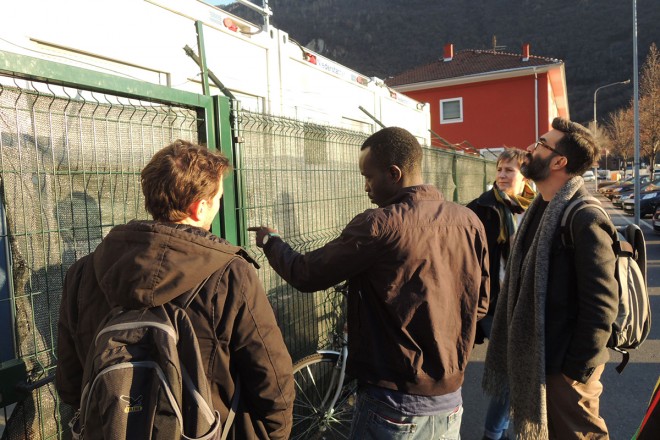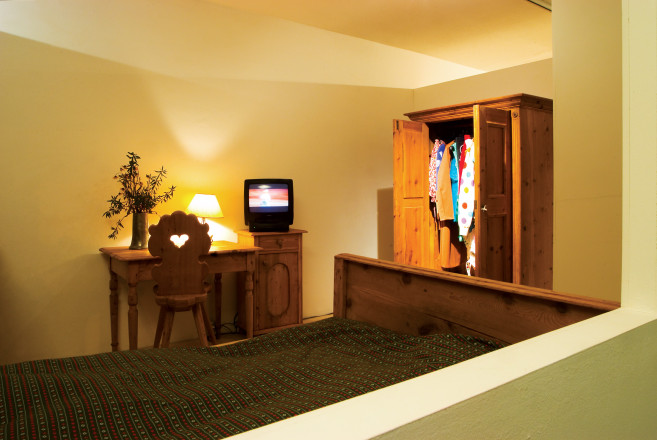Osservatorio urbano # 4
Sette per Sette
Seven people sit together around a table talking. Each person plays a given role: a mayor, a local citizen, a salesman, a tourist, a foreigner and a street artist. Suddenly the discussion is interrupted. Everyone stands up and moves to the seat on his/her left; they each take on the next role, and a new discussion begins.
The presuppositions, the matter and the contents of the film all revolve around the city of Florence. The city is never actually named, however, in order to underline the general value of the problems addressed; contextual issues help to point out that these themes are also relevant for other communities. The discussed issues include the relationship between the city, its magnificent buildings, and mass tourism – the way “normal” everyday life reconcile with such a peculiar way of interacting with a city, the way economy is connected with the city`s daily flow of tourists as well as the concepts of public order and who has the control – either real or perceived – over the city.
The participants are not actors. They bring their personal experiences within the project. Interpreting their roles as individuals who inhabit the city, they reflect upon the possibility of comparing the differing points of view and needs of the archetypes represented in the film. The scenarios are thus countless. The juxtapositions stem from the different mentalities and visions of the participants, and the various roles that they temporarily assume during the discussion group.
The project “Sette per Sette / Sieben mal sieben” has been realized within the exhibition Legal Disagreements, curated by Matteo Cavalleri and Luisa Lorenza Corna for Millepiani at Villa Romana Firenze.
Villa Romana, Florence
Osservatorio Urbano/Lungomare:
Screenplay and Direction: Angelika Burtscher, Roberto Gigliotti and Daniele Lupo
Cast: Curzio Castellan, Claudio Degasperi, Riccardo Franchi, Gianpietro Gai, Andreas Pichler, Teodora Lara Rivadeneira and Monica Trettel
Photography: Daniel Mahlknecht
Editing and Sound: Stefano Bernardi
The city of our concern is the provincial capital and the centre of a vast metropolitan area of more than 1,500,000 inhabitants. Today it has 350,000 inhabitants and its population is approximately 90% of Italian origin. The origins of the population’s foreign communities’ are different and varied (from South East Asia to Europe).
…
Mayor – as the highest administrative and political office in the city, the mayor signs and assumes the responsibility of issued regulations, for the management of the problematic situation in which the city finds itself. As a political figure, the mayor enjoys considerable visibility and defines the broad direction for the development.
…
The mayor opens the discussion with an intervention of 1 minute maximum. He/she presents his/her goals and visions for the “Regulations for civil coexistence in the city”
Each round of discussion lasts 15 minutes.
The table of negotiations is a table of discussion and not a summary of the meetings!
…
Lungomare promotes since 2005 the OU_Osservatorio Urbano project. Since its foundation in 2003, Lungomare has offered itself as a meeting place and as somewhere to exchange views on project culture and on creative arts. The underlying nature of these discussions is the curators’ desire not only to exclusively address experts but also to involve the public on a vast scale. Furthermore, the curators of the gallery have transformed these discussions into tangible interventions created both in the Lungomare exhibition space and in public spaces. The leitmotiv which links these interventions is the exploration of everyday life in all its forms. It was also starting from these assumptions that the OU_Osservatorio Urbano project was born.
The project takes on the challenge of tackling the theme of the city, avoiding a direct dialogue with the traditional instruments of town planning which are too closely connected with an objective representation of data and too far from common comprehension. A transversal approach was defined and phenomenon were tackled which were different from those usually dealt with by urban analysis and planning. The concentration was deliberately moved onto aspects such as spontaneity, emotions and unpredictability. Moreover, in order to widen the point of view proposed by the project, word is passed in the projects of OU_Osservatorio Urbano onto other disciplines and other outlooks.
The OU_Osservatorio Urbano is structed as a temporary workshop, within which it is possible to come face to face with the images and impressions that the inhabitants have of the city in which they live. The temporary laboratory is a wider long term project which proposes the objective of observing urban space in an intuitive and interdisciplinary fashion, and the creative processing of strategies for urban reading and perception.
12.05.2011
„urban matters – For a new role of art in the context of urban developments“
Lecture by Barbara Holub (transparadiso, Vienna)
Screening: „Sette per Sette“
(Video, production of Lungomare / Urban Observatory)
Barbara Holub präsentiert Projekte aus ihrer / transparadisos Praxis und stellt urban-matters.org vor: Wie kann künstlerisch-urbanes Handeln zu neuen Tools, Taktiken und Strategien führen, die die Komplexität aktueller Herausforderungen von Stadtentwicklung als gesellschaftspolitische Verantwortung jenseits neoliberalen Pragmatismus behandeln?
urban-matters.org ist Teil des Forschungsprojekts Planning Unplanned, das Barbara Holub am Institut für Kunst und Gestaltung, TU Wien, leitet. Im Zentrum steht dabei die Frage von „Planbarkeit“ vor dem Hintergrund sich permanent verändernder Parameter, denen konventionelle Methoden wie der Masterplan nicht mehr gerecht werden können.
Planning Unplanned untersucht die Möglichkeit einer neuen Rolle künstlerisch-urbanen Handelns im Zusammenhang von Stadtentwicklung, die Rolle des „urban practitioners“. Diese basiert auf den aktuellen künstlerischen und experimentellen-urbanistischen Praktiken, die in den letzten 10 Jahren allzu oft für kurzfristige Events zur Aktivierung vergessener Räume, für Problemlösungen wie dem Schaffen von Identität neuer Stadtviertel oder dem Herstellen von Kommunikation in urbanen Konfliktsituationen mißbraucht wurden, anstatt diese Praktiken als langfristiges und verantwortungsvolles Eingreifen in gesellschaftspolitische Prozesse zu begreifen, das der Komplexität dieser Prozesse Rechnung trägt.
Autonomous Province of Bolzano-South Tyrol, Culture Departments
Produced with the support of Villa Romana (Firenze)
What´s on
EXHIBITION :: Binta Diaw :: Collective Practices – A Living Experience of Feeling ListenedAbout Lungomare
Lungomare, a cultural association founded in Bolzano in 2003, was created from the desire and necessity to open a space in which to share differences, experiences, opinions and desires, a space in which to make the link between cultural production and the political and social dimension. Lungomare undertakes projects that investigate and test possible relationships between design, architecture, urban planning, art and theory, the results of which are presented in different formats: public discussions, conferences, publications, exhibitions and interventions in public spaces. All these formats are characterised by the intention to interact with cultural and socio-political processes relating to the region in which Lungomare is located.
Currently Lungomare’s activities focus on long-term residency projects, a format whereby Lungomare invites guests to engage and interact within the context of South Tyrol. Lungomare’s activities are based on three principles: specific attention to the context in which the association’s projects are undertaken, the transdisciplinary approach that distinguishes these projects, and reflection on the role of Lungomare as a cultural institution in connection with the region in which it operates.
Territory
Lungomare is located at the edge of Bolzano, the capital of South Tyrol, and relates to the context in which it operates, attempting to highlight the dynamics of change. Large urbanized areas alternate with broad areas of intensive cultivation and yet others of picturesque landscape, all of which penetrate the centre of the city. The city is surrounded by mountains and this is one of the reasons why the tourism industry has become a driving force in this locality. The demographic structure of the city has been characterized for a long time by the coexistence of two populations, those speaking German and those speaking Italian. However, the social and demographic composition of Alto Adige Südtirol is changing. Migrants, including those from non-European countries are making their way to the area to settle, whilst others, including political refugees, are flowing through the region.



